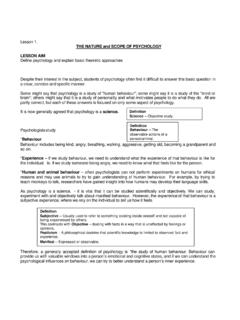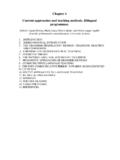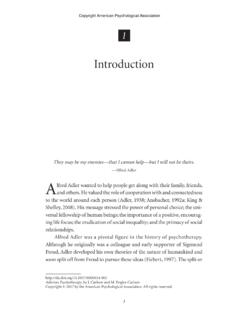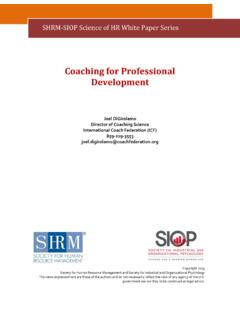Transcription of 5 Approaches in psychology - Newton Abbot College
1 Approaches in psychologyCHAPTER5123123 Approaches to amusement parksA few summers ago I (Mike) paid a visit to Tivoli Gardens, the famous amusement park in Copenhagen, Denmark. The park opened in 1843 and is the second oldest amusement park in the world. It features the world s second tallest carousel at 80 metres high (The Star Flyer pictured above) and Vertigo, a looping plane ride where the rider is able to control the plane him or herself. This one seemed to draw the loudest screams, so must have been the scariest.
2 I watched while a seemingly never-ending line of people threaded their way onto all sorts of horrifying contraptions that swung them around ancient towers, dropped them from great heights, turned them upside down at frighteningly high speeds and generally did the sorts of things that logically we should avoid at all , why do some people (like ) stare upwards at these monstrosities with a sense of absolute dread, whereas others can t wait to be twirled, dropped, rotated and generally scared witless?
3 Perhaps psychology has the answer, so try doing this activity in two CHECKLIST Origins of psychology : Wundt, introspection and the emergence of psychology as a basic assumptions of the following Approaches : Learning Approaches : i) the behaviourist approach, including classical conditioning and Pavlov s research, operant conditioning, types of reinforcement and Skinner s research; ii) social learning theory including imitation, identification, modelling, vicarious reinforcement, the role of meditational processes and Bandura s research.
4 The cognitive approach: the study of internal mental processes, the role of schemas, the use of theoretical and computer models to explain and make inferences about mental processes. The emergence of cognitive neuroscience. The biological approach: the influence of genes, biological structures and neurochemistry on behaviour. Genotype and phenotype, genetic basis of behaviour, evolution and behaviour. The psychodynamic approach: the role of the unconscious, the structure of personality, id, ego and superego, defence mechanisms including repression, denial and displacement, psychosexual stages.
5 humanistic psychology : free will, self-actualisation and Maslow s hierarchy of needs, focus on the self, congruence, the role of conditions of worth. The influence on counselling psychology . Comparison of OF CHAPTERThe origins of psychology 124 The behaviourist approach 126 Social learning theory 128 The cognitive approach 130 The biological approach 132 The psychodynamic approach 134 humanistic psychology 136 Comparison of Approaches 138 SUMMARY 140 EXAM QUESTION BANK 142 EXAM QUESTIONS WITH ANSWERS AND EXAMINER COMMENTS 144A LEVEL ONLY ZONEPart 1 (Before reading)
6 This chapter.) Why do you think some people love these rides and other people hate them?Part 2 (After reading this chapter.) Now you are more psychologically informed, how would the different Approaches explain this difference?TRY THISA LEVEL ONLY ZONE124 The origins of psychology The success of the natural sciences had a significant influence on the emergence of psychology , particularly because the scientific methods used by sciences such as biology and chemistry were regarded as the only reliable methods for discovering reliable knowledge about the world.
7 Therefore, in order to be accepted and to flourish as a subject in its own right, psychology had to adopt the methods of the natural sciences. This was not a straightforward process, as there was a long-standing belief that the human psyche was not amenable to scientific investigation. Despite this, the scene was set for a dramatic evolution in our understanding of the human condition, and, towards the end of the nineteenth century, scientific psychology was finally born. Wundt was the first person to call himself a psychologist, believing that all aspects of nature, including the human mind, could be studied scientifically.
8 His approach paved the way for the acceptance of psychology as a distinct science in its own right, and experimental psychology as the preferred method of studying human behaviour. In his laboratory in Leipzig, Germany, he studied only those aspects of behaviour that could be strictly controlled under experimental conditions. These included the study of reaction time (how long it takes people to respond to various stimuli) and various aspects of sensation and s aim was to study the structure of the human mind, and he believed that the best way to do this was to break down behaviours such as sensation and perception into their basic elements.
9 Because of this, his approach was referred to as structuralism and the technique he used as introspection. Although Wundt originally believed that all aspects of human experience could be investigated experimentally, he eventually came to realise that higher mental processes, such as learning, language and emotions, could not be studied in this strict controlled manner. These topics could instead be described in terms of general trends in behaviour among groups of people. He referred to this latter field as V lkerpsychologie (cultural psychology ).
10 IntrospectionIntrospection, from the Latin meaning looking into , is the process by which a person gains knowledge about his or her own mental and emotional states. Just as our perceptual ability enables us to observe and make sense of the outer world, our introspective ability enables us to observe our inner claimed that, with sufficient training, mental processes such as memory and perception could be observed systematically as they occurred using introspection. For example, observers might be shown an object and asked to reflect upon how they were perceiving it.






